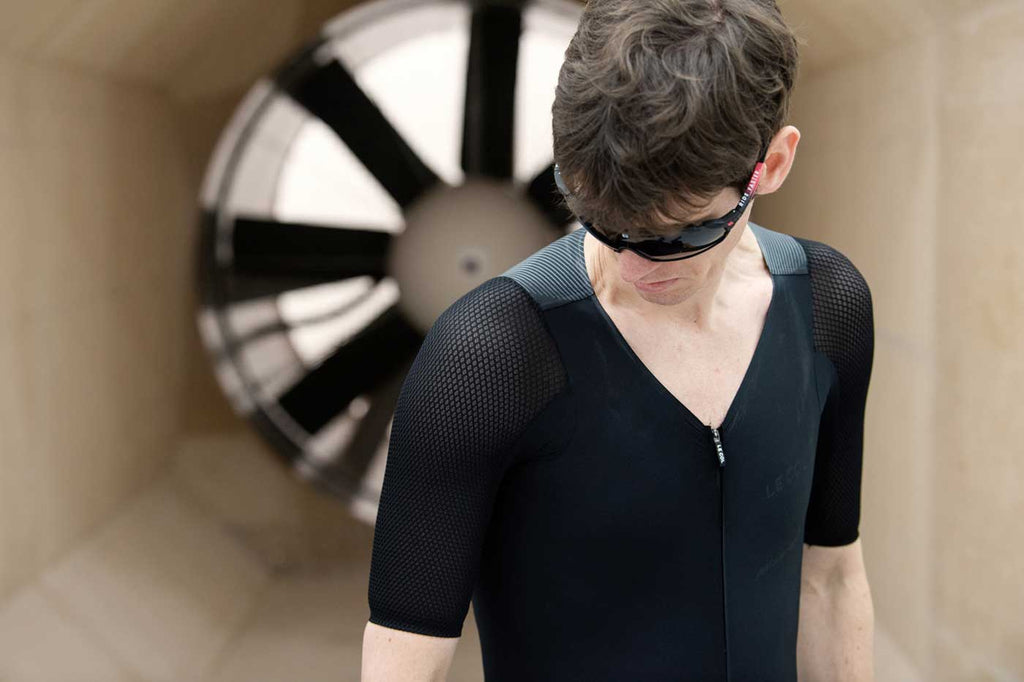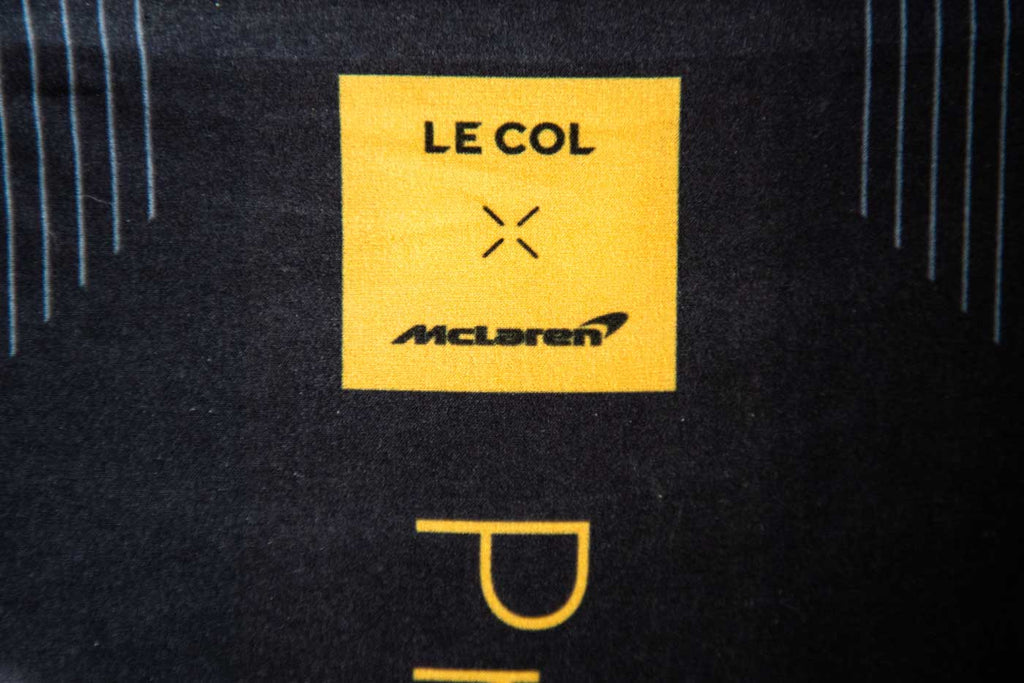The Le Col x McLaren Project Aero Speedsuit, co-developed with McLaren, makes claims to being the fastest speedsuit in cycling, and when Le Col invited us to the Silverstone Sports Engineering Hub wind tunnel to test it first hand, we saw the perfect way to test that claim.
Aerodynamic clothing has been in vogue for the last eight years or so. Many brands have released speedsuits, one piece short-jersey combos that reduce drag considerably, but fall short of the impracticality of a one-piece skinsuit with no pockets. Recent examples of game-changers in the genre include Endura’s Encapsulator skinsuit.
But let’s take a step back. Why the fixation with aerodynamics?

Rouleur in the wind tunnel with Le Col
Everything aero
While we think aerodynamics in cycling is a new and shiny invention of the early 2010s, the trend in fact embedded itself quite some time earlier. Shimano's aerodynamic Dura-Ace AX groupset, for instance, brought about holistic consideration to cycling aerodynamics never considered before, and barely matched since in bike design, in the early 1980s.
Aside from Shimano’s marketing material, though, very little consideration was given to clothing until relatively recently, with single-piece speedsuits (common in time trials for decades) only really finding their way into road races in the last five or six years. Indeed, Rob Hayles drew ridicule for wearing a home-made skinsuit at the National Championships in 2008 (though he had the last laugh).
It’s a curious oversight, as the body accounts for the vast majority of all aerodynamic drag. So much so that aerodynamicist Simon Smart once estimated that where it costs £10 per watt to cut aerodynamic drag with better clothing, it costs £333 to cut each watt with an upgrade to an aero bike frame.
“Just having a set of really fast socks will give you so many watts for £30,” says Le Col founder Yanto Barker. The brand received predictably curmudgeonly social media reactions to the price of the new Le Col x McLaren Project Aero socks, yet the gains are hugely cost-effective. “It’s disproportionately effective for the amount of material around the lower leg,” Barker adds.
“A lot of this was driven by my own desire to not get dropped by my riding friends,” Barker laughs. “I decided: I'm going to put pockets on this skinsuit, and then make it short sleeved and essentially make it a speed suit.”

Setting a baseline in the wind tunnel in non-aero Le Col Sport kit
Traditionally, a speedsuit uses a tighter fit and a slightly more aerodynamic texture. However, Le Col has taken that to the next level. The Le Col x McLaren Project Aero Speedsuit uses what Le Col called “disruptive mapped layered fabrics that manipulate the three dimensional flow topography and reduce surface friction.” Put simply, this is super slippery.
Up close, that’s evident in carefully distinguished textile panels. Over the arms is a dimpled mesh-like fabric that has an air trip – a course disruptive fabric that aims to manage the airflow over the front of the body, while also offering considerable ventilation.
Related – The best men's summer jersey
Some more subtle features offer immediate gains, such as the tight and shielded two rear pockets, accompanied by a subtle race radio pocket on the right shoulder. But the gains of the speedsuit are a result of many incremental design tweaks, and the combination of different textures and shapes has made a big difference to the performance of the speedsuit, as evidenced by some missteps along the way.

“We made one size run playing with the trip material,” says Le Col founder Yanto Barker, “And we put it all the way down from shoulders to the end of the legs. And it was just slow. Going through some of those irritating mistakes was part of the learning process.”
Of course, a crucial part of the Project Aero partnership is the link-up with McLaren. At Silverstone, managing the wind tunnel testing itself was the duty of Matthew Williams, principal aerodynamicist with McLaren racing.
“From an aerodynamic point of view, it's important to remember how all of this is integrated,” explains Williams, pointing to the issue of comparing one aerodynamic outfit to another. “You can change your helmet and it might change where the flow goes, moving your arms and even the shape of the front wheel, you can see differences in results by changing so many different things.”

That’s one reason why, while Le Col will be giving me some interesting numbers today, the brand isn’t publishing comparisons with other garments.
Number crunching
“The cycling industry kind of looks at wind tunnels as a gold standard. You go in the wind tunnel, and that's the answer. If you took something out of this wind tunnel and went into Boardman you're not going to get the same result you get from the Specialized tunnel, it's going to be different. If you go to Mercedes one, it's also going to be different.”
“I think everyone's got obsessed with these numbers to the point where I'm sure we can publish the numbers to feel really brilliant about the product,” adds Barker. “But they don't really. No one else can go and test and get that number because it's a different rider in a different environment.”

The two rear pockets on the Speedsuit are virtually invisible when empty
For Barker, the real key metric is in how fit feels and works as an overall system. “I always think 15 watts is where you will start to feel the difference – as that’s when you’ll be going about a kilometre an hour faster,” Barker explains. “And this version of the Speedsuit was something that basically provided that. I put it on and literally the first 200m out my door I was like: this is faster!”
Naturally, we have to qualify a company founder's word with some actual data, so we decided to have a few runs in the wind tunnel – while also keeping in mind that this is all just one wind tunnel with one set of controllables. Nevertheless, as a stat-driven cyclist, I was desperate to see how much difference an outfit could make.
Wind-beaten
So, a few caveats to our test... This isn't a strict comparison to see whether Le Col's Skinsuit is the fastest, as we were really looking for the overall gains of a skinsuit versus normal clothing. I also switched my helmet to reflect a more aero general setup, which will be to credit for some of the gains too. Again, we're just looking at the big picture: how much difference does aero clothing really make? For the real detail, we'd need a lot more time and a much more rigid methodology.
In our first run, I wore a conventional road combo, a Le Col Sport outfit, alongside a lightweight Poc Ventral Air helmet. Whereas with the Speedsuit I wore Le Col's Project Aero socks and a speedier Specialized Evade helmet, which would have also contributed to the overall gains. Otherwise, all elements, from bike to sunglasses, remained identical.

Testing with a conventional outfit

The most aero position, tucked on the hoods
There’s much of the real world of riding that you can’t hope to replicate in the wind tunnel, but in a small effort to bridge the gap between swirling wind, various yaw angles, a multitude of positions of the outdoors and the hermetic control of the wind tunnel, I rode in three different positions. In one run I was upright on the tops, another sloped down on the drops, and in a final run I sat in my most painfully aero position. We also ran at two speeds, 35kmh and 40kmh.
From all three initial positions, the gains in drag were obvious, not only from the live feed data, but also from the sheer noise and flapping of kit around me. In Le Col’s Speedsuit, the air could be felt rushing directly against my skin.
The results are in…
The gains were measured in watts rather than aerodynamic drag. So the results effectively show much less power I could put in to deliver the same overall speed with a different aerodynamic setup.
In the speedsuit I saved 10.8 watts, in a neutral leisurely riding position, at 35kph and 17.5 watts on the top at 40kph.
In the drops at 35kph I saved 15.6 watts and at 40kph, I saved 20 watts – a sizeable chunk of speed and effort, roughly the same gains that you would expect from upgrading from an endurance bike to an aerodynamic road bike.
Finally, in my most aero position, honed from half a dozen trips to the velodrome and wind tunnel, with my forearms parallel to the ground and my head tucked down, at 35kph the saving was 8 watts. At 40kph I saved 19.4 watts. The number naturally dipped slightly as my frontal area is at its smallest in this position, and so exposes the least amount of the baggy Le Col Sport kit.

Le Col founder Yanto Barker oversaw the testing process
So what was my take on the testing? Naturally I can’t draw any conclusions on how fast the Le Col Speedsuit is on the road until I spend a little more time with it. However, what struck me was that I was seeing the sort of gains I’d expect from a full TT skinsuit, but without the discomfort or lack of practicality (I hate wearing a skinsuit).
At £350, the Le Col Project McLaren skinsuit isn’t cheap, but it needs to be compared to the combined price of a set of bibs and a jersey, where it no longer stands out as expensive. Then, more importantly, to gain 20 watts in the wind tunnel the Speedsuit represents a minimal cost when compared to the equivalent gains from an aero frame or wheel upgrades. In performance terms, to gain 20 watts would mean a solid 6% improvement in my FTP – that’s a step up that could take years.
For some a speedsuit may be a little too serious – Jens Voigt himself once mocked me for wearing a speedsuit on a training ride at a Trek bike launch. While for those that take time-trials seriously, a Le Col x McLaren Skinsuit would really help deliver the absolute fastest setup (and we have a feeling Le Col x McLaren has an even speedier one on the way).
For most of us normal riders, the Le Col x McLaren Project Aero Jersey (effectively the top half of the skinsuit) could offer a solid gain at a smaller cost to practicality, style, and... well... cost.
Stepping back, though, Le Col’s link up with McLaren has certainly proven to be interesting for a brand that has historically focussed on simple but stylish apparel. Le Col seems seems to be serious about positioning itself as a performance brand, and delivering the products to prove it.
With that in mind, we’ll be very eager to see what comes out of Le Col’s new aerodynamic, and performance, focus over the next year. And for now, I'll see if I can smash out a few KOMs on my local routes.






























